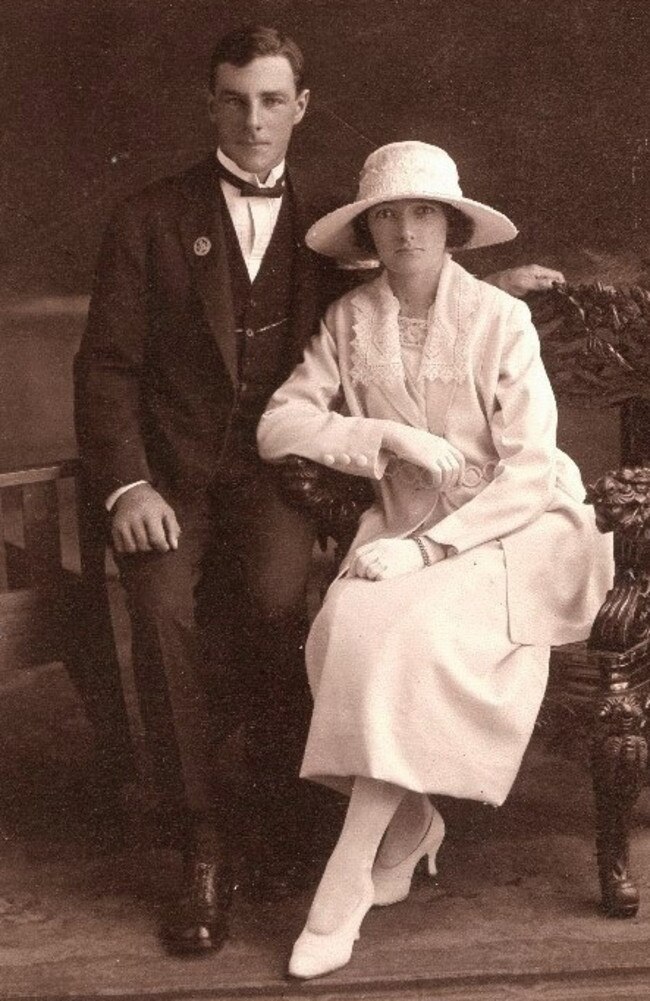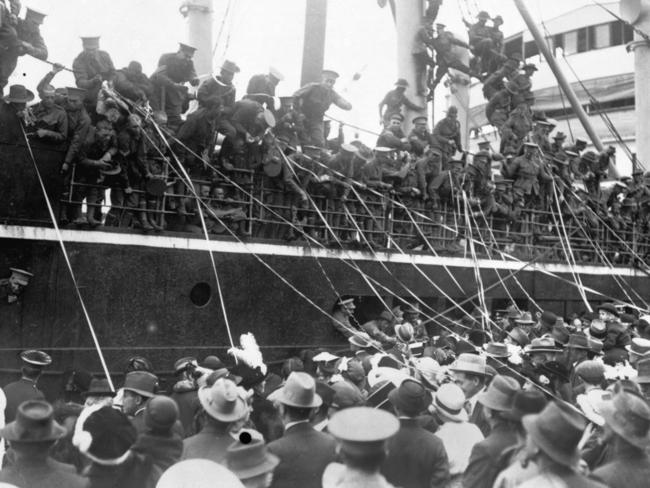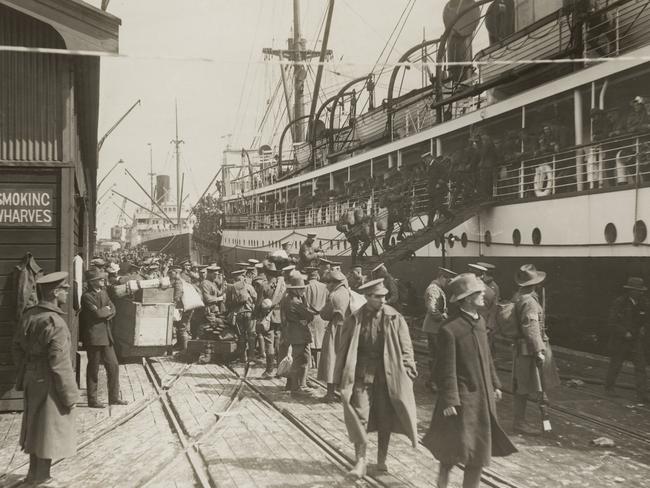The remarkable World War I love story of Eunice Lydiate and Anzac Len Hall
When Eunice Lydiate accepted a gift of feathers from an unknown soldier marching to war, it was the beginning of a love story that lasted 74 years
- From Sinatra to Bill gates: 42 must-see celebrity mugshots
- Day Mr Asia drug boss posed as Sir Joh Pjelke Petersen
Today marks the 100th anniversary of the official end of World War One. Although a ceasefire had been agreed on November 11, 1918, some fighting continued, and the war wasn’t officially over until both sides signed the Treaty of Versailles in France on June 28, 1919.
The date is doubly significant because it was on this day, five years earlier, that Archduke Franz Ferdinand was assassinated in Sarajevo, triggering a global conflict in which 40 million people were killed or wounded. That’s more than today’s populations of Australia, New Zealand, Ireland and Scotland combined.
Of the 400,000 young Australians who volunteered, 62,000 lost their lives. And those who returned were never the same. All of them left behind mates. Brothers in arms. Buried in shallow, makeshift graves. Some not even buried … their bodies left for the vultures on the barren dirt of no man’s land or the hot sands of the Palestine desert.
It’s impossible for us to appreciate what they went through. But we try. Which is why every year, on April 25 and November 11, we bow our heads and remember those who fought and died for our freedom in some corner of a foreign field that will forever be Australia.

But what of the hundreds of thousands of women who stayed home while their loved ones spilt their blood on the other side of the world? Perhaps Versailles Day, V Day, can be the day when we honour their courage and remember their resilience.
At a time when they had few rights and little social standing, the women of Australia stepped up to the challenge. They worked tirelessly, raising money for the war effort through charities such as the Red Cross, Citizens’ War Chest and the wonderfully named Cheer-up Society, which provided food, clothing and books for our Anzacs.
Many served as nurses. Some worked in factories, or kept the farms running. Others knitted blankets, socks and balaclavas for the bitter European winters. But they all had one harrowing task in common. They all had to make the excruciating walk to the mailbox every day, praying they wouldn’t find a telegram in it.
That daily dread is too awful to contemplate. As is their feeling of helplessness — unable to be there for their boys and give them the comfort only a mother or wife can give.
One such woman — just a girl, really — was Eunice Maud Lydiate. And her story is one of the brightest chapters in the depressingly dark history of the Great War.
Eunice was only 16 when war broke out in 1914. She had already lost her mother two years earlier. But on February 8, 1915, she was in the crowd at Fremantle Docks waving off the brave young men of the legendary 10th Light Horse Regiment as they sailed to war, resplendent in their famous plumed slouch hats.

As she stood there, Eunice caught the eye of one particularly handsome young trooper who, without saying a word, plucked some emu feathers from his hat and gave them to her.
His name was Len Hall. A Sydney-born bugler who, at 17, was told he was too young to volunteer. As fate would have it, an officer from the 10th — which was a new outfit and didn’t yet have a regimental bugler — heard him playing outside the barracks and signed him up.
Len went on to become one of Australia’s most heroic Anzacs. He fought at the massacre of the Nek in Gallipoli and the victorious Light Horse charge at Beersheba, where he miraculously survived being blown up by a German bomb. He also rode alongside Lawrence of Arabia at the liberation of Damascus in 1918.

Eunice didn’t know his name, or anything about him. But she kept the feathers by her heart for four long years, praying her mysterious young admirer would return.
On Australia Day 1919, as the 10th Light Horse marched back into Fremantle to a heroes’ welcome, she spotted him in the crowd. “Excuse me, sir,” she said, offering him the feathers. “I was wondering if you’d like your plume back.”
Len and Eunice fell in love and were happily married for 74 years until her death in 1995. In 1999, Len joined her. He was 101 years old.
Until his dying day, Len could never explain what made him give Eunice the feathers. Maybe it was her smile. Or perhaps some higher power was at work. Indigenous tribes, including Native Americans, believe feathers are our link to “Great Spirit” and can ward off danger. Whatever the reason, Eunice and Len’s story is an uplifting reminder that even dark times, love always — somehow — finds a way.


